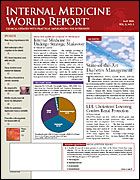Publication
Article
Internal Medicine World Report
SSRI use for Depression After Stroke Reduces Mortality
Author(s):
SAN JUAN, Puerto Rico?Stroke is strongly associated with the subsequent development of major depression, with a peak incidence of 20% to 40% at 3 to 6 months after the stroke. Effective pharmacotherapy can help prevent poststroke depression (PSD) and reduce morbidity and mortality.
Stroke
Speaking at the annual meeting of the American Association for Geriatric Psychiatry, Ellen Whyte, MD, of the University of Pittsburgh, said that even after correcting for other risk factors, depression is associated with risk of mortality, which increases with the severity of the stroke. One study (. 2001;32: 696-701) showed that the presence of stroke at 1 month predicted mortality at 12 and 24 months. "There is some evidence, albeit preliminary, that prevention [of PSD] may actually help with medical morbidity and mortality," Dr Whyte said.
Remission of PSD leads to improved functional outcomes, but rehabilitation is still not as successful as in patients who never develop PSD. Dr Whyte is conducting a study to see if preventing PSD can improve rehabilitation.
Psychosomatics
Prophylactic use of a selective serotonin reuptake inhibitor (SSRI) can prevent the development of PSD, as shown in one study of 137 patients who were randomized to sertraline (Zoloft) or to placebo within 1 week of their stroke (. 2003; 44:216 -221). In the next 12 months, the sertraline group had a 64% lower incidence of depression compared with the placebo group.
"There is some evidence, albeit preliminary, that prevention [of PSD] may actually help with medical morbidity and mortality."
-Ellen Whyte, MD
JAMA
Using examples from the cardiovascular (CV) literature, Dr Whyte illustrated that depression puts patients at risk of mortality. In the Enhancing Recovery in Coronary Heart Disease study (. 2003; 289:3106-3116), SSRI use was associated with >50% reductions in all-cause or CV mortality compared with another/no antidepressant. "Our medications in and of themselves may actually decrease risk of mortality," Dr Whyte said.
Dr Whyte noted that depression is associated with increases in platelet activation and stickiness, hypothalamic-pituitary-adrenal axis activation, inflammation, sympathetic tone, and poor health behaviors, "all of which may be reversed either through the remission of depression and/or the use of SSRI antidepressants."
Other speakers at the meeting referred to the antiplatelet effects of SSRIs, presenting trial results suggesting that sertraline, but not the tricyclic antidepressant nortriptyline (Pamelor), had CV benefits in patients with major depression and a recent MI or unstable angina.
Steven Roose, MD, professor of clinical psychiatry at Columbia University and the New York State Psychiatric Institute in New York, commented that it would be critical to know whether it is the antidepressant effect or the antiplatelet effect of SSRIs (or both) that decreases mortality. If the antiplatelet effect is primary, then possibly all patients should receive SSRIs post-MI, he suggested. But all patients with major depression should receive some form of antidepressant therapy to help prevent the associated morbidity and mortality.
Although psychotherapy can be an effective treatment for depression, Dr Whyte said there was not enough evidence to indicate that it could be effective for the prevention of PSD.
David Steffens, MD, MHS, director of geriatric psychiatry at Duke University Medical Center, Durham, NC, made the following recommendations about PSD:
? Look for depression, especially 2 to 3 months after a stroke, when incidence peaks. Depression developing during this time is less likely to spontaneously remit without treatment than depressive symptoms occurring in the days following a stroke.
? If PSD persists, prescribing an antidepressant may help. If a patient does not respond to an SSRI, switch to another class of antidepressants, such as those with multiple mechanisms of action, for example, venlafaxine (Effexor) or duloxetine (Cymbalta).
D.M.K.
? Perform a depression screen at every clinic visit or every 3 months for the first year after a stroke.?






